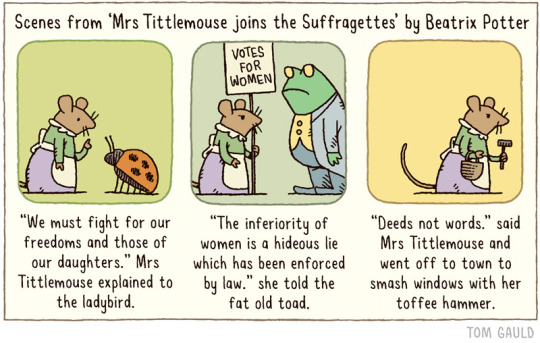#women’s suffrage
Text

838 notes
·
View notes
Text
The single most impressive fact about the attempt by American women to obtain the right to vote is how long it took. From its earliest beginnings in the public speaking of Fanny Wright in the 1820s and the Grimké sisters in the 1830s, through the complex history of equal rights suffrage associations led by such woman's-rights pioneers as Lucy Stone, Susan Anthony, and Elizabeth Stanton, it was indeed a "century of struggle" (Flexner 1959) before the suffrage amendment to the Constitution was ratified and women could first participate in a national election. Of the first generation pioneers, only Antoinette Brown Blackwell lived to cast her ballot in that first election in 1920.
-Alice S. Rossi, The Feminist Papers: From Adams to de Beauvoir
251 notes
·
View notes
Text
Listening to a podcast about British suffragettes and they’re discussing the woman who took a meat cleaver to a portrait of Venus at an art museum in protest and how the press acted like she had actually harmed a real person and called her “the ripper”… as if protesting for equal rights and damaging property was the same as actual heinous and brutal mutilations and murders of actual human women….
Emmeline Pankhurst said this and it’s sad that it’s still relevant today:
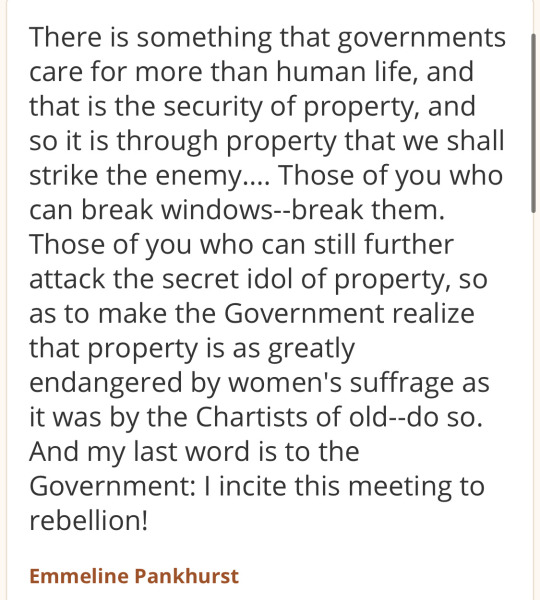
52 notes
·
View notes
Text
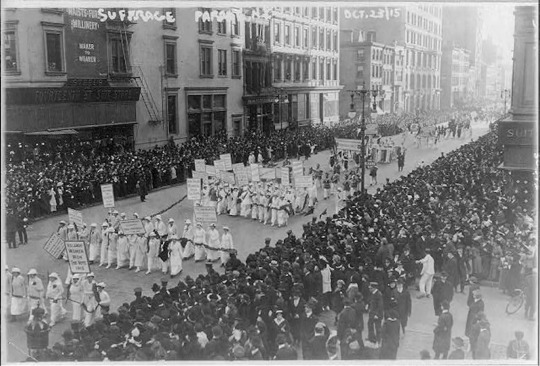
On October 23, 1915, over 25,000 women marched up Fifth Avenue in New York City to advocate for women’s suffrage. #OnThisDay
23 notes
·
View notes
Text

…who’s idea was this?
#general Jinjur#feminism#women’s suffrage#wizard of oz#the marvolous land of oz#l frank Baum#Oz books
11 notes
·
View notes
Text
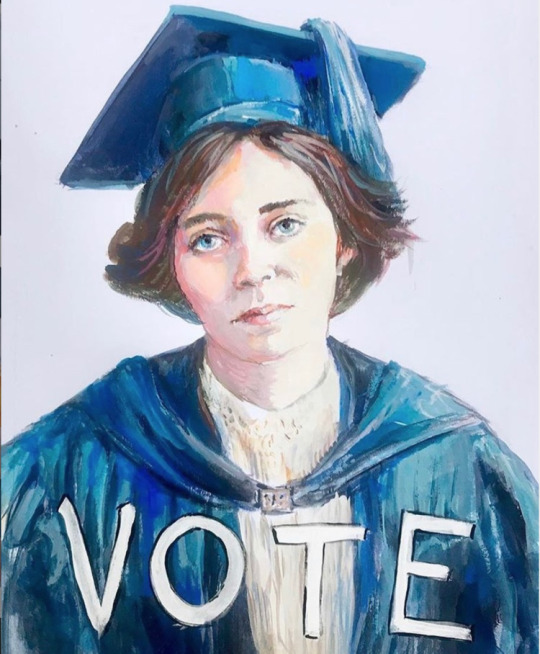
Alice Paul by Allison Adams
"Unless women are prepared to fight politically they must be content to be ignored politically."
Alice Paul (1885 -1977) was a leading civil rights activist and organizer responsible for the final push and success in winning passage of the 19th Amendment (woman suffrage) to the U.S. Constitution. After staging an 18 month long picket line outside the White House, she and many others were beaten and sentenced to prison for seven months (on the charge of “obstructing traffic”). In prison, she went on a hunger strike, but she was force-fed and temporarily institutionalized. Journalistic sympathy for their plight helped turn public and presidential support toward the cause, and in 1919, both the House and Senate passed the 19th Amendment...ending a 73-year battle for the right to vote.
#Alice Paul#Allison adams#herstory#women in history#art#artwork#civil rights#activists#women’s suffrage#suffragists#women’s rights#irl women/girls
3 notes
·
View notes
Text
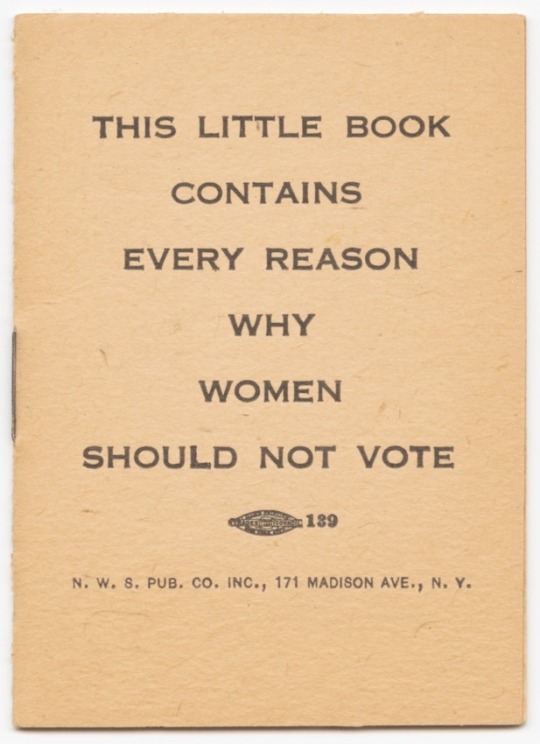
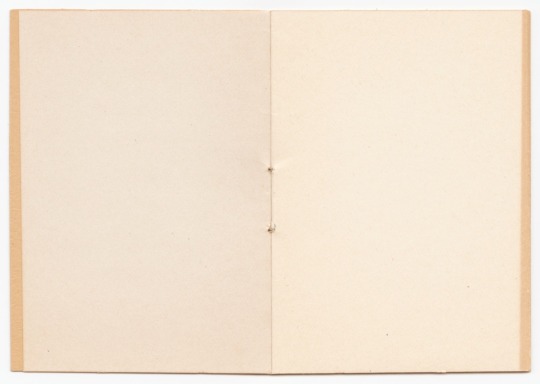
All the book's pages are blank.
7 notes
·
View notes
Text
hearing academics talk openly about bias in academia is healing my soul a bit
this is specifically about a professor of mine who is a British Historian. today we were supposed to be discussing the late Victorian and early Edwardian period. he spent a not insignificant amount of class time discussing how we need to be actively looking at what historians are not talking about, and how it’s very easy with the wealth of historical knowledge we have to purposefully ignore certain aspects. in particular, we were talking about women’s rights and the Suffragettes.
we have limited time in this course, and a very small amount of it is dedicated to the Victorian reforms under Gladstone (and others). he made a POINT to mention the Divorce Act. and to tell us that he was mentioning it purposefully.
he went on a rant about how easy it would have been for him to skip over that, to skip over the Cat and Mouse Act, the Contagious Disease Act of 1864, etc etc. but he didn’t.
there’s something very refreshing about academics, especially older male academics, being transparent about the censorship that happens in discussions of history.
11 notes
·
View notes
Text
After seeing the Barbie movie, I’ve come to the conclusion we should end women’s suffrage.
Here we stand for feminism. No woman should ever suffer again. I feel the pain of the patriarchy.
Thank you.
#Barbie movie#women’s suffrage#feminism#margo robbie#barbie#mob psycho#mp100 reigen#Reigen#reigen arataka
5 notes
·
View notes
Text
Where do you go to be safe?
Daily Note
Every day, a photograph, a poem. I am feeling the world as cold— hostile to to the female gender, treating women as chattel and incapable of planning their lives— slaves to the choices of others. This. is. not. right. This. is. not. God’s love.
This is an attack to create an undemocratic, dystopian nightmare against women and others who don’t fit someone else’s religious beliefs.…
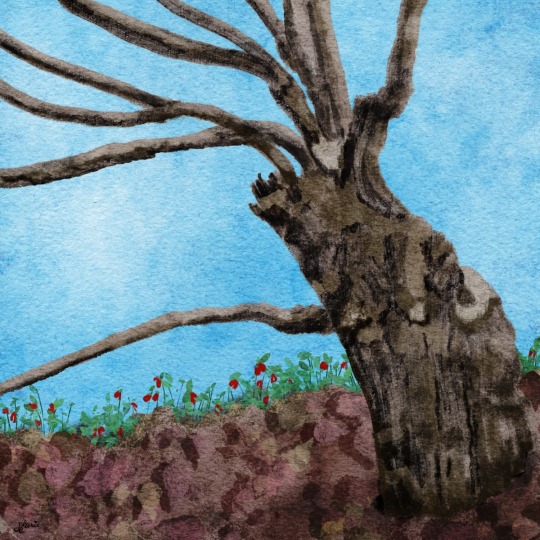
View On WordPress
0 notes
Text
As the social and religious objections appeared against the demand for political rights, the discussion became many-sided, contradictory, and as varied as the idiosyncrasies of individual character. Some said, "Man is woman's natural protector, and she can safely trust him to make laws for her." She might with fairness reply, as he uniformly robbed her of all property rights to 1848, he can not safely be trusted with her personal rights in 1880, though the fact that he did make some restitution at last, might modify her distrust in the future. However, the calendars of our courts still show that fathers deal unjustly with daughters, husbands with wives, brothers with sisters, and sons with their own mothers. Though woman needs the protection of one man against his whole sex, in pioneer life, in threading her way through a lonely forest, on the highway, or in the streets of the metropolis on a dark night, she sometimes needs, too, the protection of all men against this one. But even if she could be sure, as she is not, of the ever-present, all-protecting power of one strong arm, that would be weak indeed compared with the subtle, all-pervading influence of just and equal laws for all women. Hence woman's need of the ballot, that she may hold in her own right hand the weapon of self-protection and self-defense.
-‘History of Woman Suffrage’, in Alice S. Rossi, The Feminist Papers: From Adams to de Beauvoir
32 notes
·
View notes
Text
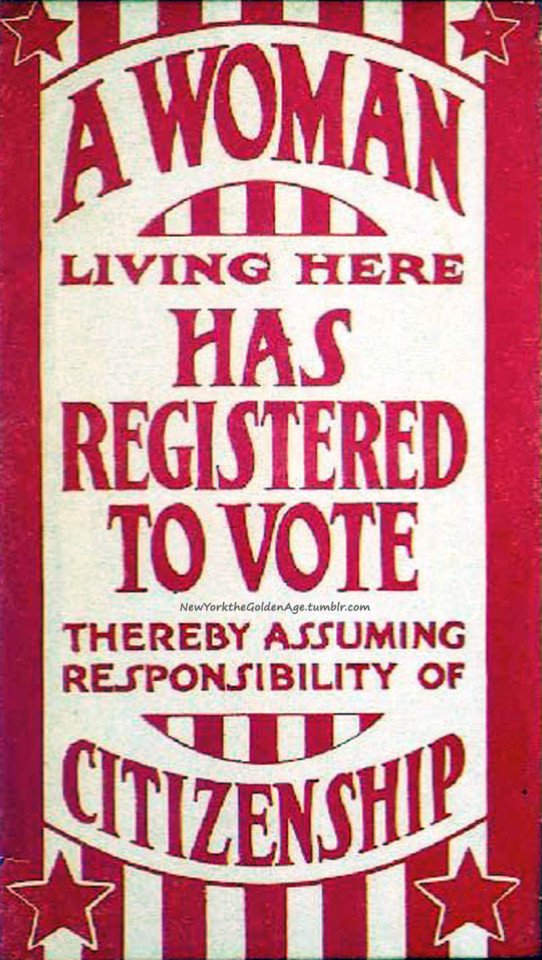
A window card from 1920, proclaiming that a newly-enfranchised woman had registered to vote.
Photo: NYC Municipal Archives
#vintage New York#1920s#19th Amendment#women's suffrage#female suffrage#poster#right to vote#voter registration#citizenship
967 notes
·
View notes
Text

Popular Mechanics, June 1911
2K notes
·
View notes
Photo
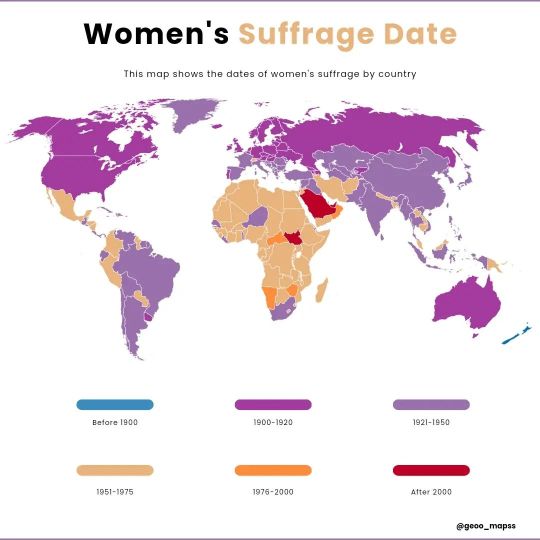
Women's Suffrage Date
by geoo_mapss
Women's suffrage is the right of women to vote in elections. Beginning in the start of the 18th century, some people sought to change voting laws to allow women to vote. Liberal political parties would go on to grant women the right to vote, increasing the number of those parties' potential constituencies.
New Zealand was the first country to grant women the right to vote in 1896.
1K notes
·
View notes
Text

Remembering the women that fought for our right to vote
150 notes
·
View notes
